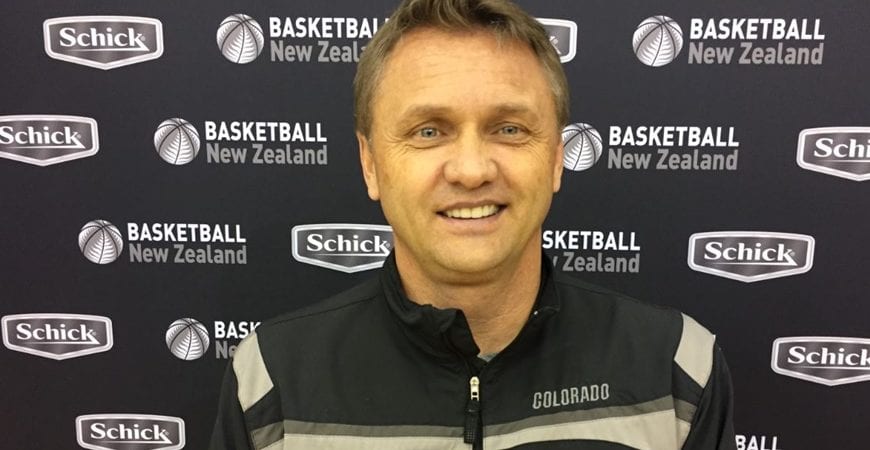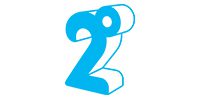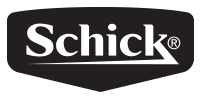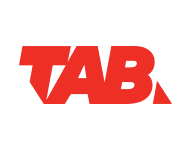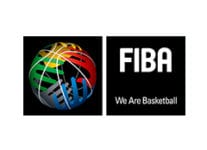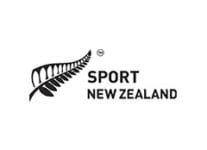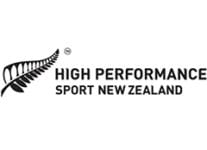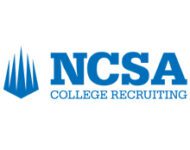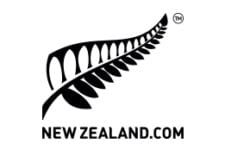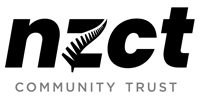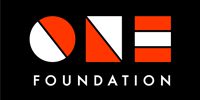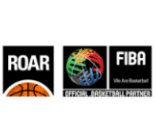Some of New Zealand’s best young basketball talent is on display at the Schick Championships, currently being played at the Central Energy Trusts Arena in Palmerston North. And for some young student athletes, there’s more on the line than national championship titles.
A number of players are being closely watched by at least six NCAA Division 1 college scouts from the United States. Basketball scouts from Georgetown University, Texas Christian University (TCU), Santa Clara University (California), the University of Hawaii, NC State University (North Carolina), and the University of Colorado are all here looking for players that could fit into their basketball programmes.
Already a few young Kiwis – some of who are playing at the event this year – have verbally committed to Division 1 schools including Junior Tall Blacks Dan Fotu (St Mary’s) and Angus McWilliam (TCU). Other New Zealand rep’ players include James Moors (Drake), Quinn Clinton (St Mary’s), Tobias Cameron (Abilene Christian), Max de Geest (Longbeach State) and of course Isaac Letoa who has already signed and departed for Dartmouth. And that’s just a few names from this year, with the November signing season still weeks off. The list goes on, a number of females are expected to announce their recruitment in November’s ‘signing season’.
In 2015 there were over 50 Kiwi women and 40 Kiwi men playing US scholarship basketball. In 2016 that figure grew another 30 players – over 70 Kiwi women and over 50 Kiwi men. Interestingly, the girls are outnumbering the boys in those figures. And this year, at the Schick Champs, the scouts seem evenly numbered between girls and boys programmes.
We interviewed five of these scouts over the course of the week.
DAVID PATRICK – TEXAS CHRISTIAN UNIVERSITY MEN’S BASKETBALL PROGRAMME
https://www.facebook.com/basketballnz/videos/747741378749692/
TCU’s Assistant Coach David Patrick was at the Schick Championships earlier this week. He has an impressive strike rate as a coach and considered one the gun recruiters, having influenced the careers of NBA stars Patty Mills, Matthew Dellavedova and most recently the 2016 number one draft in the NBA – Ben Simmons – who is Coach Patrick’s godson and has signed with the Philadelphia 76ers.
TCU’s Head Coach, Jamie Dixon, also has strong ties with New Zealand. He played in the NZ NBL for the Bay Hawks in 1989 and 1990. Coach Dixon coached Steven Adams when he was playing Division 1 basketball at Pittsburgh University. Assistant Coach Patrick says the team heading up the TCU basketball programme is very familiar with Australia and New Zealand, and that they plan to monitor young Kiwi talent with an eye for trying to find the next Steven Adams.
“I think basketball in New Zealand has made a big jump over the last three or four years. I think Australia was a little bit ahead in terms of junior development, but I think over the last few years the development of the kids has just grown leaps and bounds, and I think that’s testament to the coaches at the grassroots level and the high school level, and now these kids are coming over to the States and contributing from New Zealand just like the kids in Australia have been doing.
“I think a lot of these kids are capable of playing in the States. I think picking the right conference and right level to play at [is important]. At TCU we’re in the Big 12 – probably the best Conference in the country – we play with Kansas, Texas, Oklahoma. There’s actually a kid from New Zealand – [former Junior Tall Black] Matthew Freeman – who’s playing in our League [for Oklahoma University]. So our League is good.
“Size in our league helps, so we try to look for a kid with size and athleticism that can compete with the kids in the States.
“You look at other schools – the St. Mary’s and the Hawaii’s of the World – their League is not as big, but it’s just as skilled so the shooting that the kids have over here can somewhat adapt at those other schools.
“I think academically, New Zealand is ahead of most of the kids we have in the States. I think the bases for the kids over here, academically, suits them well when they come to school.
“TCU is a private institution. For the average student it is US$70,000 a year to go to school there. For our kids on full scholarship, not only do you get a good basketball experience but you great academic experience. So what [New Zealand players] get fundamentally here in the classroom really helps them adjust academically for us.”
DARRON LARSEN – UNIVERSITY OF HAWAII WOMEN’S BASKETBALL PROGRAMME
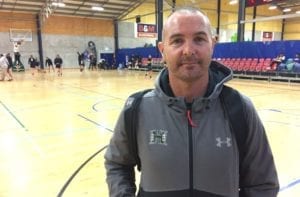
Coach Larsen is a born and bred Kiwi. Manawatu blood runs through his veins having grown up in Palmerston North and then going on to play 12 years for the Manawatu Jets in the New Zealand NBL, 1993 to 2004. He then stepped into coaching the Jets – three years as an Assistant Coach and six years as Head Coach. Coach Larsen also worked with New Zealand age-group programmes before he was shoulder-tapped by Pepperdine University and headed to the United States in 2015.
Larsen is now the Assistant Coach for University Hawaii’s Women’s team, which is a Division 1 team that plays in the Big West Conference. It’s early days in the Hawaii role, with Larsen being announced as part of the coaching team in in July 2017. Yet Larsen is keen to expand on the New Zealand player base.
Tall Ferns’ alumni Tania Tupu played for Hawaii in the 1990’s, and Ashleigh Karaitiana was also an intricate member of the team – playing for Hawaii between 2012 to early 2016. The current Head Coach of Hawaii’s Women’s Team – Laura Beeman – coached Karaitiana and Coach Larsen says she is a good indication of the talent that is in New Zealand.
“For Hawaii what our Head Coach really wants is athletes. So athletes that can get up and down, and run at a high pace, and obviously the bigger size you can get the better – not a lot of size in New Zealand, but we have got some tough, physical, hard-nosed kids and I guess that’s what brought me to New Zealand. I feel that when the New Zealand kids go to college they want to improve and work on their gains, and come back and play for the national team, so they’ll never stop working at college – they’ll improve fundamentally and individually.
“We are always really the underdogs when we play against Australia, so to have that mentality of ‘never quit’ is a big thing that I’m trying to sell [about Kiwi players] to our Head Coach.
Coach Larsen says it’s impressive how far the game has come in New Zealand. Undoubtedly it feels that the secondary basketball nationals – the Schick Championships – is bigger than ever before. There’s more players and more teams throughout New Zealand than ever before. And Larsen says the Kiwi talent is evolving.
“Especially the boys’ side. When I was playing High School Nationals, you were lucky to have one or two players over 6’3”. You look across the boys’ leagues [now] they have at least three or four guys 6’7” and above. On the girl’s side it’s a little more spread out. You have some really talented kids obviously playing in the top schools, but generally the standard has lifted so you’ll have a couple of teams knock off some big teams, it’s become more consistent throughout the girls’ side instead of your standard one or two teams that will win every year.
“You’re always going to compete with netball and things like that, but the talent level and the physicality has improved immensely, especially in the girls [tournament],” says Larson.
More and more New Zealand kids are setting their goals on US basketball scholarships, eyeing the possibilities of an overseas experience, fully funded education and the opportunity to play in next-level competitive basketball. Larsen says, of course they have to work hard, but they also have to consider their style of play.
“Probably the weakest thing I’ve seen here at the tournament is the outside shooting. Three-point shooting is such a big part of the game in our days. A lot of countries are getting rid of the mid-range game and they’re either to the rim, or kick out for threes. Australia has taken that philosophy and obviously they’re one of the top teams, especially in the junior side and the women’s side too – top four in the world – so their philosophy is one that has consistently shown around the world that you need to be able to shoot from the perimeter. So, advice to the Kiwi girls is to work on their perimeter shooting, obviously their ability to get to the rim, and really get some knock-down shooters. That would help them get to the next level, and then take that to the Tall Ferns and lift ourselves on the world stage.”
Although now based in the U.S. it’s clear Larsen is still patriotic and the New Zealand programme is still in his thoughts.
“When I was working with the Tall Blacks, I was lucky enough to get a scholarship to go and travel the world a little bit, and work with some coaches, and learn from some coaches, and one of my things was ‘how do we create pathways for our kids to get over there and obviously play against better competition, because we have always had to try and beat Australia in those qualifiers – it’s changed a little bit now that we are in the [FIBA] Asia competition – but they are still our biggest competition and instead of playing them every year, it’s good to get our kids over and experiencing different styles, and lifting our style so that we have the chance to compete with them and beat them in the future.”
For now though, Coach Larsen needs the right sort of player to fit in the Hawaii programme. Is it possible he will find that player at the Schick Championships?
“Yeah for sure. We will go back and talk with the staff in Hawaii, talk with Coach Beeman and see where we are at with our year-levels and which [players] stand out. Obviously they are going to have to watch some of these kids – I have been sending back the schedule for the live feed so they watch on Maori TV, it’s fantastic to have Maori TV involved in this to show our kids to a wider audience – so they’ll have a chance to watch the kids and when I go back I’ll have an easier-sell for some of them.”
KRISTIN IWANAGA – SANTA CLARA UNIVERSITY WOMEN’S BASKETBALL PROGRAMME

Another Division 1 scout in attendance is Kristin Iwanaga, Assistant Coach for Santa Clara University’s women’s team (California), which plays in the West Coast Conference.
Coach Iwanaga played Division 1 basketball herself, at Cal’ Berkeley where Tall Fern Penina Davidson currently plays. Iwanaga has coached at the Division 1 level for nine years and says she’s looking for well-rounded female players.
“Players that can dribble, pass, shoot, and obviously they’ll also have to have good grades in the academic side,” says Iwanaga.
“My boss, Head Coach Bill Carr, came over last year and met some different coaches in the area and mentioned that this was a good tournament to come to and watch a lot of high school players, so he decided to send me this year.
“Obviously we’ve heard of some good players that were over here, so we wanted to see everyone at this national tournament since we know all of the best high school teams have qualified.
“It’s a great tournament, it’s well organised. There are a lot of games going on at once, so I can definitely watch a lot of the teams play.
“All the girls are playing hard and competing, and I know that to win a National Championship would be huge for all of these kids.
“We would definitely love to get a Kiwi player over to Santa Clara University. I know there’s other Kiwis playing at other Division 1 schools, so we definitely want to get one of our own.”
Coach Iwanaga says Santa Clara currently has one Kiwi player in their team – Dru Toleafoa – who played for the Tall Ferns in 2014 and is on the Tall Ferns’ longlist.
MIKE ROHN – ASSITANT COACH UNIVERSITY OF COLARADO MEN’S BASKETBALL TEAM
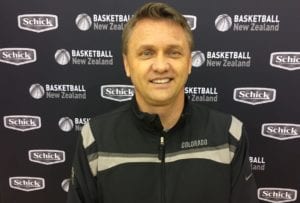
Assistant Coach Mike Rohn has devoted his life to the game of basketball. He played college basketball in the States at the NEIA level before taking on the coaching life. He is now in his 28th year as a coach and going into his eighth year at the University of Colorado. He’s coached at many levels – Junior College, Division 2, NEIA, and now he’s at the major-level of US college hoops.
The university of Colorado competes in the Pac-12 Conference – one of the ‘Power Five’ conferences in the United States. Last year the University of Colorado broke the record with 14 draft picks in the first and second NBA rounds. It’s also considered to be in the top 50 academic universities in the world.
“We get the best of both worlds,” says Rohn. “We get as good a basketball level as there is being played at a University level. And then obviously a very good academic situation too.”
Having Coach Rohn taking a long-haul flight to New Zealand, when his team’s pre-season is underway, is an indication that US Colleges truly believe there is a worthy level of talent here in New Zealand.
“I heard there were a lot of good players here in the championships. And it was during a period of time when we weren’t playing games yet, so I got out of the first week of practice to come and watch some games.”
So, what does Coach Rohn think – after being at the Schick Champs for a couple days, is there talent that would fit into the University of Colorado’s elite basketball programme?
“I think there is after watching today. I definitely think there is a group of players that can play in the United States. Some at different levels, without a doubt, so it was a good trip and I’m anxious to see some more.
“We look for the same thing in players whether we are in New Zealand or the US. To play in the Pac-12 you have to have a certain level of talent, a certain level of size to you at your position. We are kind of fortunate because we get the tallest guys at each position – the point guards could be anywhere from 6’4’ to 6’6” – obviously the size for your position is pretty critical.
“And then just basic level of skill – can they dribble pass and shoot – and a lot of little things. One of the things that made us really good at the University of Colorado is just finding the little things about guys – what sort of team mates they are, how hard they play, how well they understand the game. Those little things are very important to us.”
Rohn says they spend a lot of time watching film to get an idea of players, particularly the FIBA events.
“The universities are doing a really good job of evaluating foreign teams. We watch a lot of the FIBA games that are being played by the Under 16s and Under 17s, so we get a very good feel for how the New Zealand teams play, and the foreign teams in general. We are starting to learn a lot from the foreign teams too, so it’s exciting that kids here can translate their games to the US.”
So will we see Kiwis heading that way? Rohn says there’s a chance offers may wing their way back to Aotearoa.
“Yeah, quite possibly. There were certainly a few guys I knew about that triggered my interest in coming all the way over here, because I had not seen them live and in person yet – I’d seen them on film a lot. I definitely came over specifically for a couple of guys, but have been fortunate to like a couple of other guys that I didn’t know about, so that’s always a positive too.”
GENE HILL – RECRUITING COORDINATOR NC STATE WOMEN’S BASKETBALL
https://www.facebook.com/basketballnz/videos/747745868749243/
In 2013 the NC State women’s basketball programme hired Gene Hill as their assistant coach and recruiting coordinator. The team’s Head Coach, Wes Moore, said at the time “Gene is a guy I’ve wanted to hire for 15 years and great to see that come to fruition.”
Coach Hill has an impressive history when scouting and developing, including a clutch who have since been drafted to the WNBA. He’s been involved with various programmes since the 1990s, so there wouldn’t be much that Hill doesn’t know about women’s US college basketball. And right now Hill is using that knowledge to recruit talent for NC State’s women’s team, which plays in the famous Atlantic Coast Conference. This past year Hill’s team finished 17th in the United States and made the second round of the big NCAA Tournament. So what’s he doing so far from home, at the Schick Championships in Palmerston North, New Zealand?
“You have to go wherever the talent is and New Zealand basketball is really growing. There are a lot of young prospects in the system. I’ve had a chance to see a lot of them with the National team the last past couple of years and we wanted to get out here and watch them some more.”
NC State have not been here before, says Hill, but he thinks they will be visiting more frequently from now on.
“I think [New Zealand’s] international game really fits our style of play. We try to spread the floor out and play a free flowing game where we allow our players to just play the game and create for themselves a little bit – and that’s the international style. Right now you see a lot of movement in the game, great passes, kids doing a lot of the fundamental things – that’s important to us, to find players who can do those things.
“These young ladies are used to playing with shot clocks, so they come in a little bit more ahead of the game verses typical high school kids. Their training – playing with the National team and their club teams – all those things helps benefit them and progress them.”
It’s a mix that Hill says could fit well with NC State.
“We have a great group of young ladies, our Head Coach Wes Moore has been very successful in all his stops. We’re just really looking forward to continue to build on our previous success.”
As for advice for Kiwi kids, Hill says it’s nothing unusual, just good old fashion stuff.
“Continue to work hard, practice, work on the fundamental things – the dribbling, the shooting, the passing – do all the things academically, put themselves out there and not be afraid to stretch themselves geographically or on the court. I see a lot of potential talent here, a lot of young kids and great coaches, so I think there’s a really bright future for New Zealand.”

